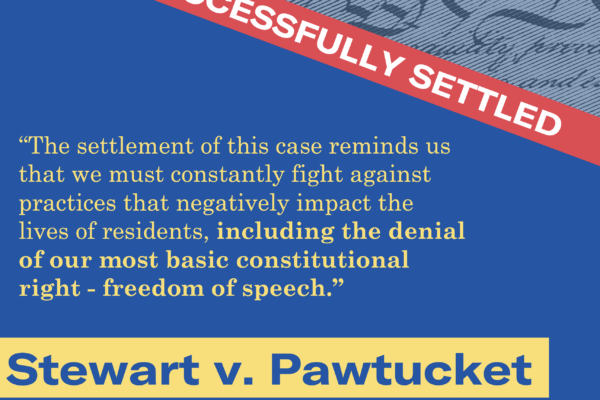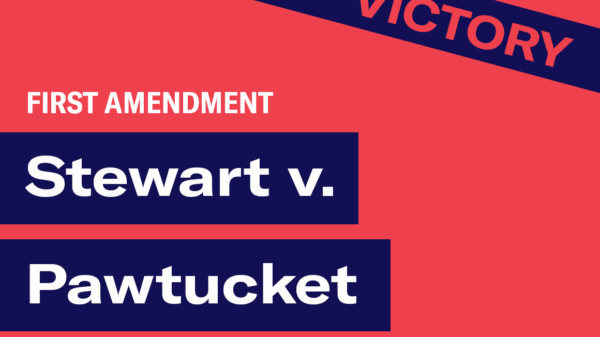The ACLU of Rhode Island today announced the settlement of a lawsuit, filed in July, over a Pawtucket ordinance banning the posting of political signs on residential property more than 30 days before an election. The lawsuit had been filed by ACLU of Rhode Island cooperating attorney Richard A. Sinapi on behalf of two candidates who were running in primaries for state legislative office in the city, Cherie Cruz (House District 58) and Jennifer Stewart (House District 59), and who both have since won their elections. Enforcement of the ordinance was put on hold after the suit was filed.
Under the settlement agreement filed with the court today, the city is barred from “prohibiting the erection and/or display of political campaign signs, including but not limited to candidate campaign signs or issue signs, or from subjecting the posting of any such signs to durational limits” or “from imposing any size, placement, and/or illumination restrictions on political campaign signs, including but not limited to candidate campaign signs or issue signs, that are more stringent than those imposed on non-political signs.” The City also agreed to pay $18,311.77 in attorneys’ fees and $500 each in compensatory damages to Stewart and Cruz. Both candidates indicated that they would donate their award of damages to the ACLU of RI.
In early July, after Stewart had placed more than 30 candidate yard signs at supporters’ homes, she received a call from the City Registrar, informing her of the ordinance at issue and advising her that if the signs were not taken down, he would refer the matter to zoning officials “who could issue fines to the individuals who had signs in their yards before the date he identified.” Similarly, after Cruz began distributing her signs to supporters, she too learned from city officials that anybody erecting her signs more than 30 days before the election could be fined.
The ACLU lawsuit argued that the posting of residential political signs was protected by the First Amendment, and noted that as candidates lacking significant name recognition, both Stewart and Cruz “rely heavily on inexpensive campaign lawn signs to … communicate their candidacies to potential voters.” The lawsuit cited a slew of court decisions dating back decades, including ones from Rhode Island, that have held durational limits on the posting of political signs to be unconstitutional.
Plaintiff Stewart said today: “I am grateful to our lawyer, Richard Sinapi, and to the ACLU for their work on our behalf to ensure the Bill of Rights applies in Pawtucket. The resolution of this lawsuit is a victory for free speech in Pawtucket. I hope Pawtucket - and every city and town in Rhode Island - takes this opportunity to review their laws and repeal those which are unconstitutional and undermine democracy.”
Plaintiff Cruz added: “This lawsuit was not just about signs, it was about a basic right of residents to freely express their political and electoral views. The settlement of this case reminds us that we must constantly fight against practices that negatively impact the lives of residents, including the denial of our most basic constitutional right - freedom of speech.”
ACLU of RI cooperating attorney Sinapi said: “I applaud the City’s decision to amicably settle this lawsuit, since decades of court decisions have made it abundantly clear that limiting political speech in this manner simply cannot withstand constitutional scrutiny. This settlement should place all other cities and towns with similar ordinances on notice that there is a price to pay for violating their residents’ core First Amendment rights of political speech.”
A copy of the settlement and the filed complaint can be found here.


